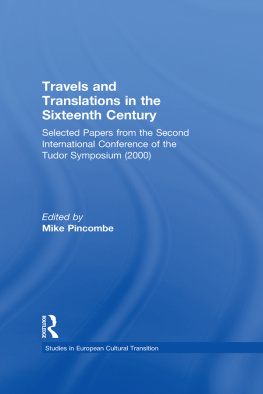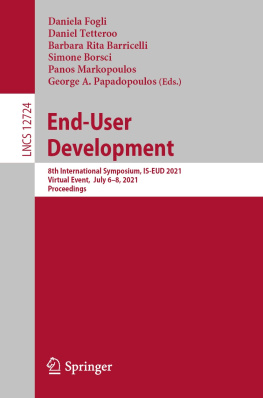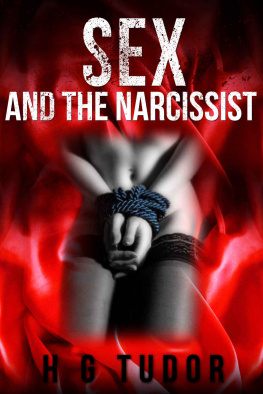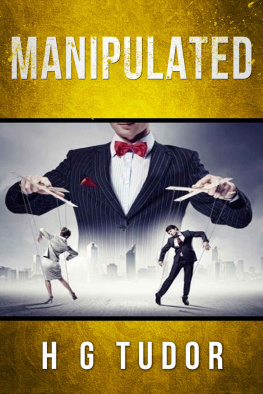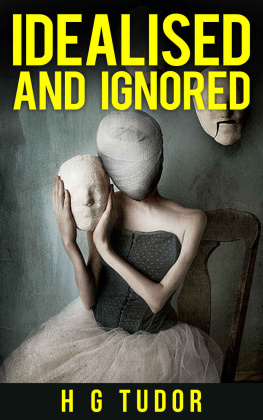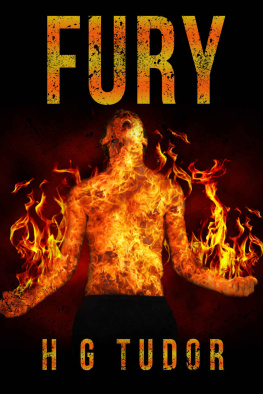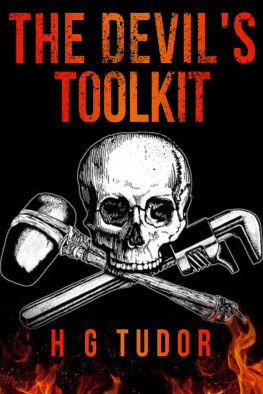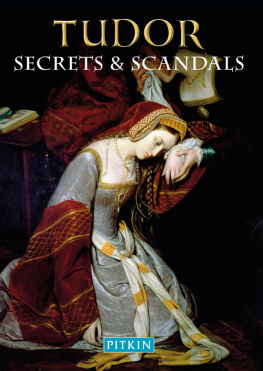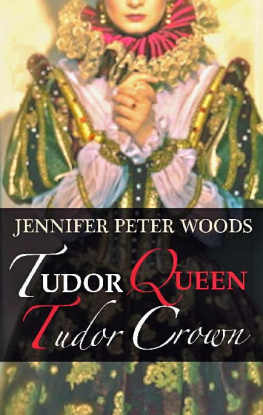THE ANATOMY OF TUDOR LITERATURE
In memoriam
Gareth Roberts
The Anatomy of Tudor Literature
Proceedings of the First International Conference
of the Tudor Symposium (1998)
Edited by
MIKE PINCOMBE
First published 2001 by Ashgate Publishing
Reissued 2018 by Routledge
2 Park Square, Milton Park, Abingdon, Oxon OX14 4RN
711 Third Avenue, New York, NY 10017, USA
Routledge is an imprint of the Taylor & Francis Group, an informa business
Copyright Mike Pincombe and contributors, 2001
The editor has asserted his moral right under the Copyright, Designs and Patents Act, 1988, to be identifed as the editor of this work.
All rights reserved. No part of this book may be reprinted or reproduced or utilised in any form or by any electronic, mechanical, or other means, now known or hereafter invented, including photocopying and recording, or in any information storage or retrieval system, without permission in writing from the publishers.
Notice:
Product or corporate names may be trademarks or registered trademarks, and are used only for identification and explanation without intent to infringe.
Publishers Note
The publisher has gone to great lengths to ensure the quality of this reprint but points out that some imperfections in the original copies may be apparent.
Disclaimer
The publisher has made every effort to trace copyright holders and welcomes correspondence from those they have been unable to contact.
A Library of Congress record exists under LC control number: 00066516
ISBN 13: 978-1-138-70455-8 (hbk)
ISBN 13: 978-1-315-20262-4 (ebk)
Contents
Mike Pincombe
Peter Happ
Gillian Day
Andrew Hiscock
Jill Barker
Tom Betteridge
Gareth Roberts
Katherine Wilson
Regina Schneider
Jonathan Gibson
Natasha Distiller
Efterpi Mitsi
Swen Voekel
Anthony Martin
Mara ONeill
Carol Banks
Stefani Brusberg-Kiermeier
Tracey Hill
My thanks to all who made the conference such an enjoyable experience. Rowena Bryson made sure we had plenty of good food and drink; and Janie Mills helped with refreshments. Fiona Griffiths provided secretarial assistance; and two successive Deans of Arts at Newcastle, Jerry Paterson and Eric Cross, have been very supportive towards the Tudor Symposium in general. My thanks also to Erika Gaffney of Ashgate for devising such an apt and illuminating title for this volume and to Pat FitzGerald and Tom Norton for preparing camera-ready copy and the index.
But my main debt of gratitude is towards the members of the conference themselves. It was very satisfying to gather together so many clever and delightful people from all over the world in the homely surroundings of the Percy Building. Sadly, this was the last time I saw Gareth Roberts before his untimely death early in 1999. Gareth was a model of humanitas: learned, urbane, convivial. We will all miss him very much; and to him this volume is dedicated.
I have tried to impose a certain degree of uniformity on the presentation of the essays which follow. Where old-spelling texts have been used, they have been normalised: i/j and u/v have been modernised; contractions have been expanded; proper nouns have been deitalicised. These are all changes which do not alter the literary signifance of the words as they were originally written or printed. Titles, however, appear in modern spelling. References to primary sources are keyed by line, page, folio, signature, etc., to a list included at the end of each essay. References to secondary sources are keyed by name, year, and page number to a general list at the end of the volume.
CahiersE | Cahiers Elisabthains |
CompD | Comparative Drama |
DNB | Dictionary of National Bibliography |
E&S | Essays and Studies |
EiC | Essays in Criticism |
ELH | English Literary History |
ELR | English Literary Renaissance |
HLQ | Huntington Library Quarterly |
JEGP | Journal of English and Germanic Philology |
JWCI | Journal of the Warburg and Courtauld Institutes |
M&H | Medievalia et Humanistica |
MLN | Modern Language Notes |
MLQ | Modern Language Quarterly |
MP | Modern Philology |
MRDE | Medieval and Renaissance Drama in England |
N&Q | Notes and Queries |
OED | Oxford English Dictionary |
PMLA | Publications of the Modern Language Association |
RenQ | Renaissance Quarterly |
RES | Review of English Studies |
SCJ | Sixteenth-Century Journal |
SEL | Studies in English Literature |
ShakS | Shakespeare Studies |
ShS | Shakespeare Survey |
SP | Studies in Philology |
SQ | Shakespeare Quarterly |
SSF | Studies in Short Fiction |
STC | Short Title Catalogue |
TSLL | Texas Studies in Language and Literature |
MIKE PINCOMBE
It is customary for introductions to volumes which contain collections of essays, or, as in this case, the proceedings of a conference, to provide a brief summary of each piece of work, and, often with great ingenuity, to offer an overview of the collection as a whole. However, since the papers delivered at the first international conference of the Tudor Symposium in April 1998 were so diverse indeed, they were intended to be very various it seems a futile exercise to follow the usual procedure. Instead, I wish to take occasion, as Convenor of the Tudor Symposium, rather than as editor of the present volume, to make a few remarks on what I perceive to be one of the most important items on its critical agenda: the overthrow of the prejudice against mid-Tudor literature amongst modern literary academics, including some specialists in Renaissance or early modern studies. I place the blame for this prejudice very squarely on the shoulders of C.S. Lewis in his magisterial volume for the Oxford History of English Literature: English Literature in the Sixteenth Century Excluding Drama (1954). Lewis famously dismissed the literature written between the end of the reign of Henry VIII to the late 1570s as Drab. Of course, this was not intended as a dyslogistic term (p. 64). Lewis concedes that some of the work produced in these three decades and more is neat and temperate. However, we may suspect some disingenuousness on Lewiss part here; certainly his words have had a devastating effect on the study of mid-Tudor literature. Everybody knows that the Drab Age is one to be passed over quickly before you get to the Golden Age which Lewis (as most other critics) likes best. But it is my view that the literature of this period is not so much drab as tarnished. If it seems dull, it is because it has not been used enough. Handle it more frequently, and it will soon recover its true shine. I will return to the ordinary purpose of an introduction to a volume such as this a eulogy of its contents later in this essay; but let me proceed by explaining the origins of the Tudor Symposium in a general revolt against the post-Lewisian condition of sixteenth-century studies.


